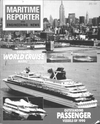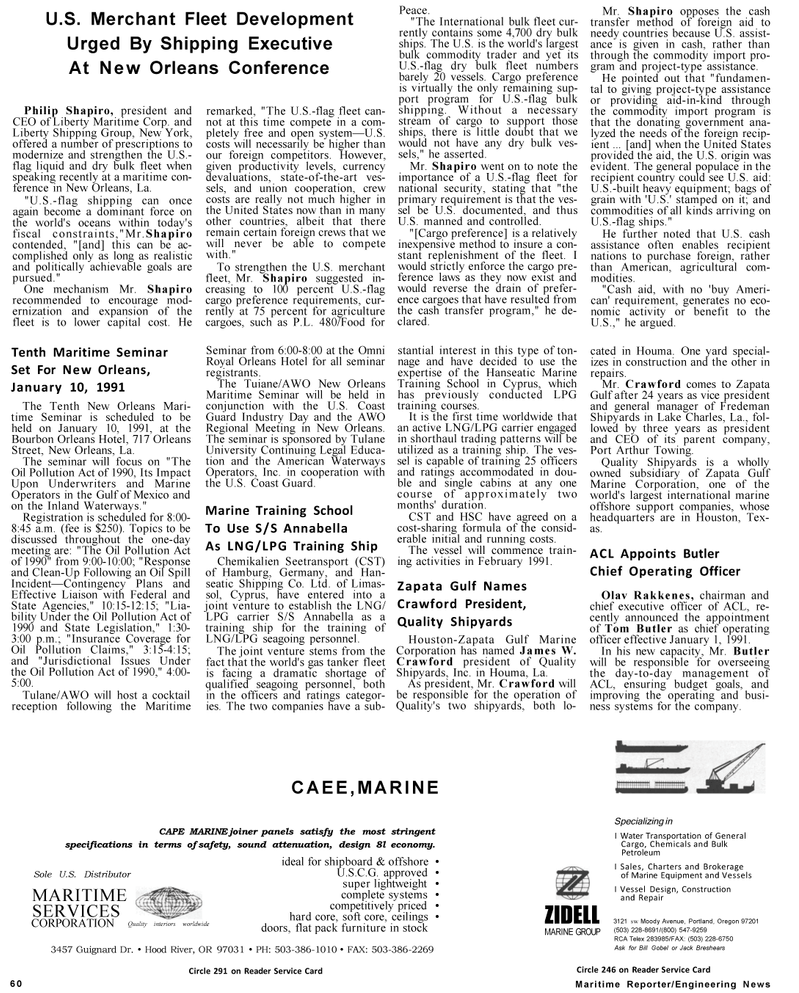
Page 56: of Maritime Reporter Magazine (January 1991)
Read this page in Pdf, Flash or Html5 edition of January 1991 Maritime Reporter Magazine
U.S. Merchant Fleet Development
Urged By Shipping Executive
At New Orleans Conference
Philip Shapiro, president and
CEO of Liberty Maritime Corp. and
Liberty Shipping Group, New York, offered a number of prescriptions to modernize and strengthen the U.S.- flag liquid and dry bulk fleet when speaking recently at a maritime con- ference in New Orleans, La. "U.S.-flag shipping can once again become a dominant force on the world's oceans within today's fiscal constraints,"Mr.Shapiro contended, "[and] this can be ac- complished only as long as realistic and politically achievable goals are pursued."
One mechanism Mr. Shapiro recommended to encourage mod- ernization and expansion of the fleet is to lower capital cost. He remarked, "The U.S.-flag fleet can- not at this time compete in a com- pletely free and open system—U.S. costs will necessarily be higher than our foreign competitors. However, given productivity levels, currency devaluations, state-of-the-art ves- sels, and union cooperation, crew costs are really not much higher in the United States now than in many other countries, albeit that there remain certain foreign crews that we will never be able to compete with."
To strengthen the U.S. merchant fleet, Mr. Shapiro suggested in- creasing to 100 percent U.S.-flag cargo preference requirements, cur- rently at 75 percent for agriculture cargoes, such as P.L. 480/Food for
Peace. "The International bulk fleet cur- rently contains some 4,700 dry bulk ships. The U.S. is the world's largest bulk commodity trader and yet its
U.S.-flag dry bulk fleet numbers barely 20 vessels. Cargo preference is virtually the only remaining sup- port program for U.S.-flag bulk shipping. Without a necessary stream of cargo to support those ships, there is little doubt that we would not have any dry bulk ves- sels," he asserted.
Mr. Shapiro went on to note the importance of a U.S.-flag fleet for national security, stating that "the primary requirement is that the ves- sel be U.S. documented, and thus
U.S. manned and controlled. "[Cargo preference] is a relatively inexpensive method to insure a con- stant replenishment of the fleet. I would strictly enforce the cargo pre- ference laws as they now exist and would reverse the drain of prefer- ence cargoes that have resulted from the cash transfer program," he de- clared.
Mr. Shapiro opposes the cash transfer method of foreign aid to needy countries because U.S. assist- ance is given in cash, rather than through the commodity import pro- gram and project-type assistance.
He pointed out that "fundamen- tal to giving project-type assistance or providing aid-in-kind through the commodity import program is that the donating government ana- lyzed the needs of the foreign recip- ient ... [and] when the United States provided the aid, the U.S. origin was evident. The general populace in the recipient country could see U.S. aid:
U.S.-built heavy equipment; bags of grain with 'U.S.' stamped on it; and commodities of all kinds arriving on
U.S.-flag ships."
He further noted that U.S. cash assistance often enables recipient nations to purchase foreign, rather than American, agricultural com- modities. "Cash aid, with no 'buy Ameri- can' requirement, generates no eco- nomic activity or benefit to the
U.S.," he argued.
Tenth Maritime Seminar
Set For New Orleans,
January 10, 1991
The Tenth New Orleans Mari- time Seminar is scheduled to be held on January 10, 1991, at the
Bourbon Orleans Hotel, 717 Orleans
Street, New Orleans, La.
The seminar will focus on "The
Oil Pollution Act of 1990, Its Impact
Upon Underwriters and Marine
Operators in the Gulf of Mexico and on the Inland Waterways."
Registration is scheduled for 8:00- 8:45 a.m. (fee is $250). Topics to be discussed throughout the one-day meeting are: "The Oil Pollution Act of 1990" from 9:00-10:00; "Response and Clean-Up Following an Oil Spill
Incident—Contingency Plans and
Effective Liaison with Federal and
State Agencies," 10:15-12:15; "Lia- bility Under the Oil Pollution Act of 1990 and State Legislation," 1:30- 3:00 p.m.; "Insurance Coverage for
Oil Pollution Claims," 3:15-4:15; and "Jurisdictional Issues Under the Oil Pollution Act of 1990," 4:00- 5:00.
Tulane/AWO will host a cocktail reception following the Maritime
Seminar from 6:00-8:00 at the Omni
Royal Orleans Hotel for all seminar registrants.
The Tuiane/AWO New Orleans
Maritime Seminar will be held in conjunction with the U.S. Coast
Guard Industry Day and the AWO
Regional Meeting in New Orleans.
The seminar is sponsored by Tulane
University Continuing Legal Educa- tion and the American Waterways
Operators, Inc. in cooperation with the U.S. Coast Guard.
Marine Training School
To Use S/S Annabella
As LNG/LPG Training Ship
Chemikalien Seetransport (CST) of Hamburg, Germany, and Han- seatic Shipping Co. Ltd. of Limas- sol, Cyprus, have entered into a joint venture to establish the LNG/
LPG carrier S/S Annabella as a training ship for the training of
LNG/LPG seagoing personnel.
The joint venture stems from the fact that the world's gas tanker fleet is facing a dramatic shortage of qualified seagoing personnel, both in the officers and ratings categor- ies. The two companies have a sub- stantial interest in this type of ton- nage and have decided to use the expertise of the Hanseatic Marine
Training School in Cyprus, which has previously conducted LPG training courses.
It is the first time worldwide that an active LNG/LPG carrier engaged in shorthaul trading patterns will be utilized as a training ship. The ves- sel is capable of training 25 officers and ratings accommodated in dou- ble and single cabins at any one course of approximately two months' duration.
CST and HSC have agreed on a cost-sharing formula of the consid- erable initial and running costs.
The vessel will commence train- ing activities in February 1991.
Zapata Gulf Names
Crawford President,
Quality Shipyards
Houston-Zapata Gulf Marine
Corporation has named James W.
Crawford president of Quality
Shipyards, Inc. in Houma, La.
As president, Mr. Crawford will be responsible for the operation of
Quality's two shipyards, both lo- cated in Houma. One yard special- izes in construction and the other in repairs.
Mr. Crawford comes to Zapata
Gulf after 24 years as vice president and general manager of Fredeman
Shipyards in Lake Charles, La., fol- lowed by three years as president and CEO of its parent company,
Port Arthur Towing.
Quality Shipyards is a wholly owned subsidiary of Zapata Gulf
Marine Corporation, one of the world's largest international marine offshore support companies, whose headquarters are in Houston, Tex- as.
ACL Appoints Butler
Chief Operating Officer
Olav Rakkenes, chairman and chief executive officer of ACL, re- cently announced the appointment of Tom Butler as chief operating officer effective January 1, 1991.
In his new capacity, Mr. Butler will be responsible for overseeing the day-to-day management of
ACL, ensuring budget goals, and improving the operating and busi- ness systems for the company.
CAEE,MARINE
CAPE MARINE joiner panels satisfy the most stringent specifications in terms of safety, sound attenuation, design 8l economy. ideal for shipboard & offshore •
U.S.C.G. approved • super lightweight • complete systems • competitively priced • hard core, soft core, ceilings • doors, flat pack furniture in stock
Sole U.S. Distributor
MARITIME SERVICES
CORPORATION Quality interiors worldwide 3457 Guignard Dr. • Hood River, OR 97031 • PH: 503-386-1010 • FAX: 503-386-2269
ZIDELL
MARINE GROUP
Specializing in
I Water Transportation of General
Cargo, Chemicals and Bulk
Petroleum
I Sales, Charters and Brokerage of Marine Equipment and Vessels
I Vessel Design, Construction and Repair 3121 sw Moody Avenue, Portland, Oregon 97201 (503) 228-8691/(800) 547-9259
RCA Telex 283985/FAX: (503) 228-6750
Ask for Bill Gobel or Jack Breshears 60
Circle 291 on Reader Service Card Circle 246 on Reader Service Card
Maritime Reporter/Engineering News

 55
55

 57
57
